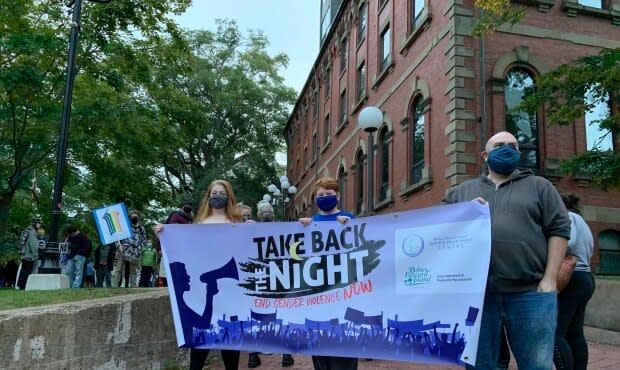Marchers in Charlottetown demand end to gender-based violence
About 150 people marched through the street in Charlottetown on Thursday night for the Take Back the Night March.
The march aimed to raise awareness of gender-based violence, and called for solutions to it through systematic and institutional change.
"Not only raise awareness, but to really let survivors know that they're supported, that they're heard and that they're believed. And what they've experienced wasn't their fault. It's never their fault," said Dr. Rachael Crowder, executive director of the Rape and Sexual Assault Centre and the organizer of the march.
The event included speeches about how to address gender-based violence and change the narrative so that gender-based violence becomes a thing of the past. Crowder said everyone has a part to play.
"This isn't just a women's issue. We really need to be inviting everybody into the conversation," she said.

"The rates of crime, especially sexualized violence, have actually increased. Reported incidents have increased where all other rates of crimes have started to drop. So we still have lots of work to do."
Crowder said whether or not that people are aware of it, there's a good chance that they know someone affected by gender-based violence.
"This is an issue that touches each and every one of us. Because if you're not a survivor yourself, you know a survivor, even if you haven't been told ... even if someone has not disclosed to you, you know, someone, it's just statistically impossible that you don't know a survivor or haven't met one," she said.

"You need to really open your mind and your heart to understanding the issue, the ramifications and really how it's touching your life when you may not even really realize it."
Similar rallies have been held across the world for decades, but as time has gone on, the conversation has evolved, said Crowder.
"There are so many other kinds of intersectional pieces that can complicate or exacerbate or, you know, maybe even escalate the rate of gender-based violence," she said.
"When you're talking about Black, Indigenous, people of colour, women with disabilities, the LGBTQ community."
Pam Atkinson, having marched in Take Back the Night marches 15 years ago, said she was encouraged to see so many people out on Thursday and said this demonstration was a bit different than the one she took part in over a decade ago.
"It's much the same and much different. So it's a lot more inclusive this time around. We weren't even, 15 years ago, talking about trans issues and we weren't really even talking about the LGBTQ community being part of this. And now there are so many different people involved," she said.
"It's not surprising we're here 15 years later, because of our cultural society and that change happens so slowly."
'Gender-based violence doesn't exist alone'
For Sweta Daboo, there were two things that she will be taking away from Thursday's event.
"The first one was a very strong sense of community, looking at the variety of people who've come together to make this event a reality," she said.

"The second thing also is the importance of having an intersectional approach when you look at gender-based violence, because gender-based violence doesn't exist alone in a bubble."
For Crowder, she hopes that people watching took the message, and did some research on their own about gender-based violence and what they can do to stop it. For those in the march, Crowder said she hopes they took away a feeling of support.
"I hope that they felt empowered, especially if they are survivors themselves. I hope they felt believed and supported," said Crowder.
More from CBC P.E.I.


